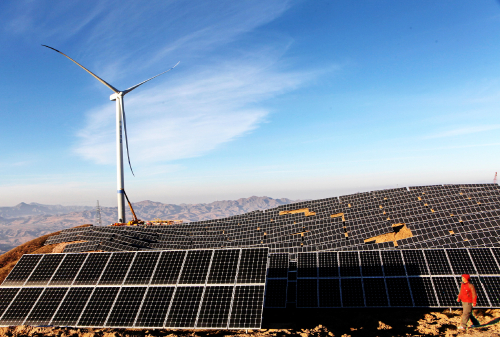 |
|
A PROMISING ALTERNATIVES: Pictured is a solar power plant in Xuanhua County, north China's Hebei Province. In the first three quarters, solar power plants have generated 18 billion kilowatt hours of electricity, two times the total electricity generated by solar in 2013 (YANG SHIYAO) |
Inflation Eases
In November, China's consumer prices showed the slowest rate of growth in five years, increasing the possibility of more easing measures by the central bank.
China's consumer price index (CPI), the main gauge of inflation, rose by 1.4 percent year on year in November, the slowest increase since November 2009, said the National Bureau of Statistics (NBS) on December 10.
Yu Qiumei, a senior NBS statistician, attributed the record-low inflation level to seasonal and international factors.
On a monthly basis, November's CPI dipped 0.2 percent against the previous month, while data remained flat in October.
For the first 10 months, inflation grew 2 percent year on year, well below the 3.5-percent full-year target set by the government.
Food prices, which account for about one third of the CPI calculation's weighting, rose 2.3 percent from a year ago in November, lifting CPI 0.77 percentage points, compared to 2.5 percent and 0.83 percentage points respectively in the previous month.
Meanwhile, China's factory gate price decline deepened in November as a slowing economy and housing market downturn weakened domestic demand for industrial goods.
The producer price index (PPI), which measures inflation at wholesale level, dropped 2.7 percent year on year in November, its largest fall in 18 months, the NBS said.
The factory gate prices in November decreased for a record 33rd month in a row. In the first 11 months, the country's PPI fell 1.8 percent year on year.
Yu attributed the drop to the lower prices of oil and natural gas; refined oil; and chemicals, which contributed to a 0.4-percentage-point fall in November's PPI reading.
Lackluster Trade
China's export growth slowed sharply in November while imports unexpectedly contracted, putting pressure on policy makers to release further stimulus measures.
China's exports rose 4.7 percent year on year to $211.66 billion in November, the General Administration of Customs (GAC) said on December 8. The figure sharply contrasts with October's 11.6 percent and 15.3 percent in September.
Imports stood at $157.19 billion, down 6.7 percent year on year, the biggest drop since March.
Total exports and imports in November amounted to $368.85 billion, down 0.5 percent year on year with a record-high trade surplus of $54.47 billion, expanding 61.4 percent.
In the first 11 months of the year, China's imports and exports hit $3.9 trillion, up 3.4 percent, resulting in a record trade surplus of $332.5 billion during the January-November period, up 42.2 percent year on year.
The sharp slowdown in export growth threatened China's growth this year, as both domestic and external demand weakened, ANZ economist Liu Ligang said in a report in response to the data.
Maiden Voyage
China Shipping Container Lines (CSCL) Globe, the world's largest container vessel, embarked on its maiden voyage to Europe on December 8 in Shanghai.
The CSCL Globe leads the line of five 19,100-TEU (20-feet Equivalent Unit) container ships ordered by CSCL in 2013. It was built by Hyundai Heavy Industries in South Korea.
Boasting a huge size of 400 meters long and 60 meters wide, the vessel travels at a speed of 43 km per hour. Its loading capacity exceeds Maersk Line's 18,000-TEU as the world's largest container vessel.
Compared with ordinary 10,000-TEU container ships, it can save about 20 percent in energy consumption and reduce 30,000 tons of carbon emissions.
CSCL, affiliated with the China Shipping Group, is a global container liner service provider. Founded in 1997, the Shanghai-based company is listed both in Hong Kong and Shanghai.
